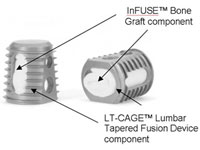
Medtronic Inc.’s (NYSE:MDT) Infuse bone-growth protein may increase patients’ cancer risk more than previously suggested, according to new research.
Patients who underwent procedures using Infuse more than doubled their cancer risk within one year of use, according to Stanford University School of Medicine professor and Spine Journal editor of Dr. Eugene Carragee. The cancer risk grew to almost five-fold after three years, he said.
The Spine Journal‘s (PDF) June issue was devoted entirely to exposing problems with growth proteins, including a repudiation of some of the research surrounding Infuse. The journal’s investigation found that 13 Medtronic-backed studies downplayed or omitted entirely evidence of safety risks from Infuse.
The ensuing clamor spurred federal investigations into allegations that Medtronic’s paid consultants may have concealed Infuse’s risks. The din grew loud enough that Medtronic CEO Omar Ishrak’s first official statement when he took the corner office in June was a response to the challenges leveled against Infuse.
"While the Spine Journal articles raise questions about researchers’ conclusions in their published peer-reviewed literature, the articles do not raise questions about the data Medtronic submitted to the FDA in the approval process or the information available to physicians today through the instructions for use brochure attached to each product sold," Ishrak said at the time. "Based on that data, we strongly believe that the safety profile reported to the FDA and summarized in the product label support the safe use of rhBMP-2 for the identified indications."
The morphogenetic protein, used in spinal fusion surgeries, has recently been the subject of federal probes and personal injury lawsuits over concerns that it causes excess bone growth, may lead to retrograde ejaculation in men and might increase cancer risks.
The protein in Infuse has been under scrutiny as a cancer-promoting agent before, concerns that were noted by a July 2010 FDA advisory panel meeting for the higher-dose version of the protein, Amplify. That panel’s vote split 6-to-5, with three abstentions, that the device’s benefits outweigh any risks.
Clinical studies in advance of the panel hearing found 15 incidents of cancer among Amplify patients, compared to five incidents in the control group. In March 2011, cancer concerns led the FDA to put the kaibosh on MDT’s Amplify spine device.
Carragee’s new data suggests that cancer risks associated with Infuse, the lower-dose compound, may be greater than noted in previous clinical studies. Using pooled data made available by the FDA, Carragee found higher rates of cancer among Infuse patients than among the control group, Reuters reported.
Medtronic has weathered the Infuse storm, but problems linger as patient lawsuits pile up and federal investigators probe deeper into the relationship between the med-tech giant and its paid surgeons.
The June issue of the Spine Journal reported that, although 13 industry-funded reports (published by authors who collectively received millions from Medtronic) found no adverse events associated with the protein used in Infuse, the actual rate of "frequent and occasionally catastrophic complications"of between "10 percent to 50 percent depending on approach."
"The surgeons who led Medtronic’s trials said there were no adverse events," president of the Assn. for Medical Ethics Dr. Charles Rosen told Reuters. "They said what they needed to say to sell the product."
"For several years Medtronic has been leading the industry in reforms designed to eliminate or mitigate conflicts of interest. We will continue to investigate questions surrounding researchers’ potential conflicts of interest, refine our policies as warranted, and strive to lead the industry in ethical and transparent business practices," Medtronic CEO Ishrak said in his June statement.
In August, Medtronic responded to the growing controversy by offering a $2.5 million grant to Yale researchers who will review the safety of the company’s controversial Infuse bone graft product.

